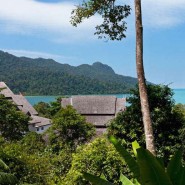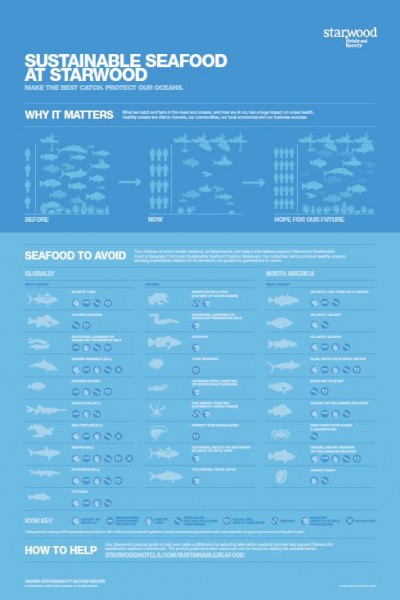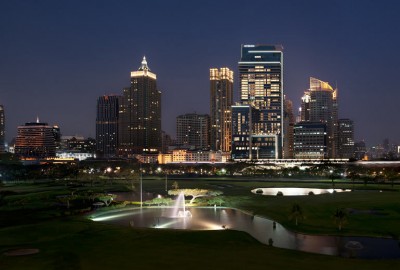 The Andaman Luxury Collection resort, Langkawi, Malaysia
The Andaman Luxury Collection resort, Langkawi, Malaysia
Starwood Hotels & Resorts has revealed a guide that will help guarantee that guests make responsible dining choices.
Alongside New England Aquarium, Starwood has created a poster, guide and other materials that will help with the selection of sustainable and local seafood. Numerous seafood species are threatened or endangered, and taking an active stance on the issue is in line with Starwood’s repeated initiatives to position itself as an environmental leader.
“Our poster, pocket guide and support materials are for Starwood associates to make procurement decisions, and having a NGO partner like New England Aquarium is key to us getting the most relevant information out to our hotels and resorts around the world,” said Andrea Pinabell, vice president of sustainability at Starwood.
“In addition, many Starwood properties incorporate guest-facing sustainable seafood programming into the menus,” she said. “For example, with a wink to the canned tuna one may purchase at the supermarket, which may not be caught in a sustainable way, executive chef Sebastien Le Gall at The St. Regis Mauritius Resort, Le Morne, Mauritius, prepares sustainably sourced fish from local fisherman in little cans.”
Catching the big fish
In the past, Starwood has taken measures that show the importance it places on the environment. In 2012, all hotels owned by Starwood removed whale and sea turtle from menus. In 2014, Starwood hotels became the first to institute a ban on shark fins (see story).
Starwood seafood poster
“Our philosophy in Gallery is to simply respect the ingredient,” said David Moore, chef at Gallery, a restaurant at The Ballantyne Hotel & Lodge, a The Luxury Collection Hotel in Charlotte, NC. “We focus aggressively on embracing the theories that impact that philosophy and this, in turn, affects our creativity.
"Being observant of the sustainably sensitive nature of what we do each day is not lost on Gallery cooks," he said. "We strive to foster a level of foundational connectivity to ingredients, guests and farmers that cultivates uninhibited innovation.”
Now, Starwood has launched guides that will help its hotels select catches from local sources that will help the community and environment in the long run. Overfishing particular species and seafood delicacies has threatened the long-term survival, while commercial fishing techniques often introduce environmental issues.
Furthermore, how seafood is caught or farmed impacts not only the ocean, but also the health of consumers and the economies of Starwood hotels and the communities in which they operate.
St. Regis Bangkok
“For any chef in any hotel, the statement and tools say ‘I am involved and can make a difference,’” said Matthew Woolford, culinary director at The St. Regis Bangkok. “There is a sense of commeraderie among chefs to do the right thing and use the best ingredients, which goes beyond being locally sourced to understanding traceability and responsible fishing. As a chef, I deal with the farmers and I’m proud to know the product and the stories behind the products.”
Today, it is not enough for hotels to merely provide great service. An increased awareness of the environment and shifting values in younger generations has made the ideals of a brand, particularly with regards to the environment, equally important.
This concern manifests itself in part through consumers’ more specific or choosy culinary preferences and dining habits. Repeated initiatives that showcase those values will allow Starwood to form closer bonds with patrons and consumers.
The Andaman resort
Although many of these changes are behind-the-scenes, Starwood’s guests will still have a chance to see them more visibly. Not unlike the cans at the St. Regis Mauritius Resort, in the afternoons at The Andaman, Langkawi, Malaysia, a Luxury Collection resort, patrons might find the hotel’s culinary team negotiating with locals on the priced of seafood.
“Sustainable seafood is not only part of how we do the right thing, but it also helps protect the delicate ecosystems where we operate,” Ms. Pinabell said. “In addition, these efforts promote a thriving local economy, which in turn protects and enhances our business. Each of our properties is part of and contributes to the local communities where we operate.”
Going green
Starwood Hotels and Resorts has also positioned itself as a sustainable brand by furthering its efforts to reduce water usage across all its properties.
Efforts to conserve water include more efficient irrigation, low-flow faucets, collecting and recycling water and an option for customers to request reduced housekeeping services in exchange for Starpoints, a voucher or a charitable donation. The initiative cements Starwood as a leader in water conservation efforts, emphasizes its global awareness and is likely to appeal to a younger, more environmentally conscious demographic (see story).
Conglomerates in other industries are equally emphatic about turning the attention of consumers and competitors alike toward the environment.
For example, French luxury conglomerate Kering is helping the world visualize its environmental impact with an interactive environmental profit and loss statement.
Kering’s results page on the conglomerate’s Web site contains a grid depicting the various steps in production and environmental categories in which it could make an impact, with each square containing a circle in relation to the impact that has been made. Kering’s transparency shows its dedication and the steps it has taken while also helping other companies to examine where they can make changes one step at a time (see story).
“Starwood prides itself on innovation and industry leadership in everything we do,” Ms. Pinabell said. “Sustainable seafood is no exception as it is a tangible way for us to integrate sustainability into the guest experience.”
Final Take
Forrest Cardamenis, editorial assistant on Luxury Daily, New York



